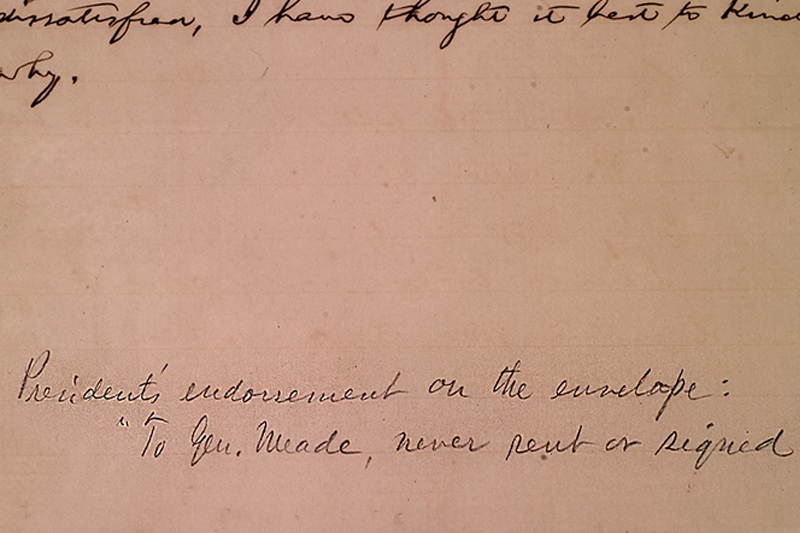NEVER SENT OR SIGNED
After the horrific carnage at Gettysburg, President Lincoln ordered Union General George Meade to pursue the retreating Confederate army. Robert E. Lee’s weakened force was trapped at the Potomac River, and Lincoln was convinced that the Union forces could destroy them and put a swift end to the war.
But General Meade did not obey Lincoln’s orders. He concluded that his soldiers were too battle-weary and distraught after the butchery at Gettysburg to fight again so soon. When Lincoln discovered Meade had disregarded his orders, he was furious and wrote a blistering letter to the General, chastising him in no uncertain terms. However, at the bottom of the letter, Lincoln wrote, “Never sent, or signed.” Abraham Lincoln was a great president not just because of his speech at Gettysburg, but also for what he chose not to express a few days after the pivotal battle.
The Bible says, “My dear brothers and sisters, take note of this: Everyone should be quick to listen, slow to speak, and slow to become angry because human anger does not produce the righteousness that God desires” (James 1:19-20). How many times do we regret words spoken in haste or typed in anger?
However, the problem is not just hurtful words expressed in anger. Sometimes, flippant words spoken in jest can bring regret. My wife has been experiencing vertigo issues for the past several months. She also has considerable arthritis in her knees, which has significantly limited her mobility. Naturally, she walks at a much slower pace than she did in her younger years. We recently had dinner with three other couples, and someone remarked about how agile his wife was. He reported that even though she’s 86 years old, a friend nicknamed her “Sandpiper” because she still walks so quickly.
Since I enjoy laughter, I immediately looked for something funny to say in response. Without thinking, I quipped, “Judy could be compared to a… sloth!” Well, I’m an idiot. As soon as I said it, I knew it was inappropriate and disrespectful. Judy didn’t try to say something cutting in return. She wisely remained silent. I was immediately convicted. There was no way out except to apologize. I’m extremely thankful for a gracious wife who can forgive and forget. Otherwise, we wouldn’t have lasted for 58 years of marriage.
The next time the same group got together, my friends ceremonially presented me with a golf club head cover – you guessed it – a clever reproduction of a sloth. My great granddaughter enjoys playing with it as a toy when she visits. But I don’t much enjoy seeing it on the shelf because it reminds me of my failure to be “slow to speak.”
Sure, there are times to speak up, but silence often has the power to avoid hurt feelings and maybe even serious strife. One of the most remarkable things about Jesus is that He remained silent when false accusers attempted to humiliate Him. He didn’t respond. “He was oppressed and afflicted, yet he did not open his mouth; he was led like a lamb to the slaughter, and as a sheep before its shearers is silent, so He did not open His mouth” (Isaiah 53:7). Even the pagan Pontius Pilate was impressed with Jesus’ self-control.
Are you a person who can’t stand it when you’re criticized, or when your favorite team is ridiculed, or when someone expresses an opposing political opinion, or when you’re the target of sarcasm? Do you always need to have the last word? Do you think it’s your assigned role to say something funny at every awkward moment? If so, you are likely to say things you later regret and you would do well to review the following Proverbs:
“Sin is not ended by multiplying words, but the prudent hold their tongues” (Prov. 10:19).
“Whoever derides their neighbor has no sense, but the one who has understanding holds their tongue” (Proverbs 11:12).
“Even fools are thought wise if they keep silent, and discerning if they hold their tongues” (Proverbs 17:28).
“A fool vents all his feelings, but a wise man holds them back” (Proverbs 29:11 NKJV).
The temptation to speak can sometimes feel impossible to restrain. But it isn’t. God says that He will always give us a way out (see 1 Corinthians 10:13), and we “can do all things through Christ who gives us strength” (Philippians 4:13). So, when you find yourself wanting to snap back at someone, say something edgy, or send a nasty tweet, stop! Bite your lip. Don’t push send. Count to ten. Walk away. Anyone can spout off their opinions. It takes wisdom to know when to be quiet. Our testimony for Christ could be so much stronger if, like Lincoln, we could write under the inappropriate thoughts that pop into our head, “Never signed, never sent.”
“We all stumble in many ways. Anyone who is never at fault in what they say is perfect, able to keep their whole body in check” (James 3:2).


